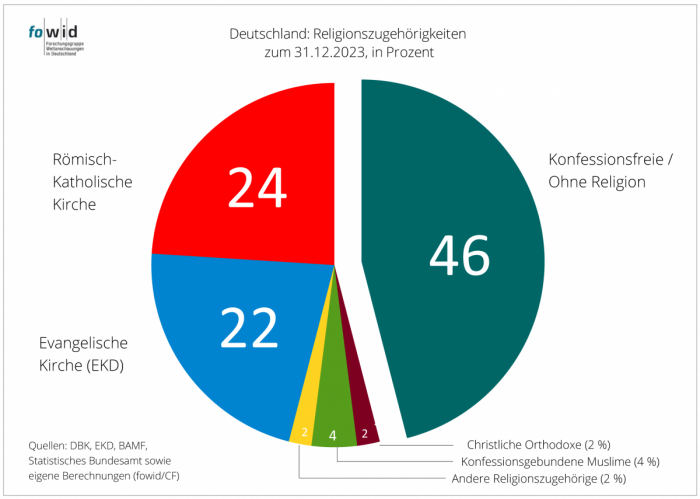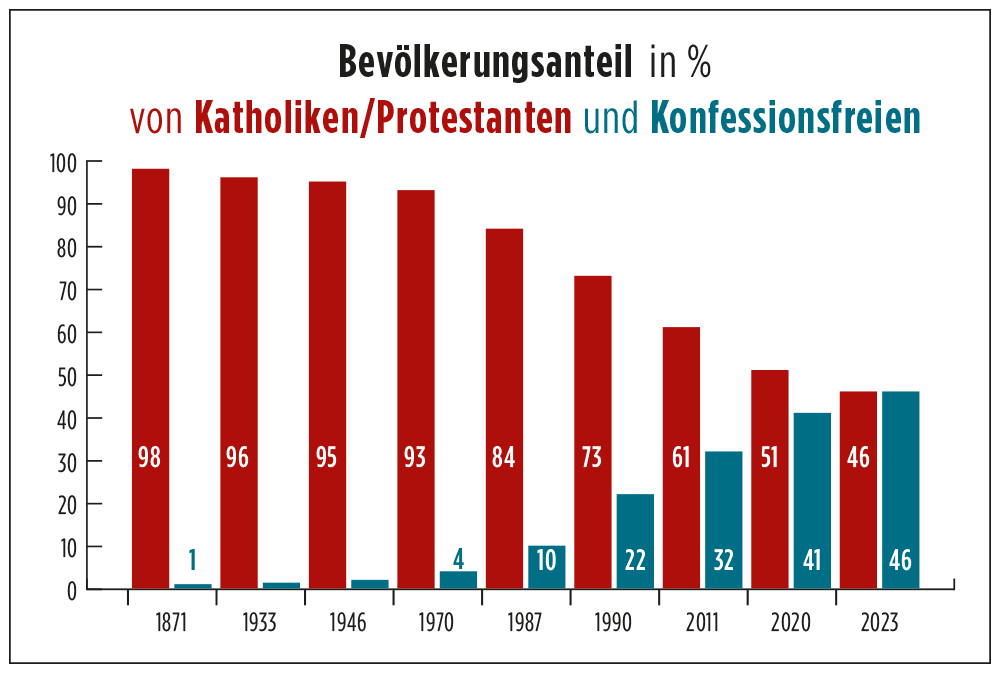As Many Non-Denominational People as Catholics and Protestants in Germany
Current fowid Data Shows Increasing Departure from Religion

fowid-torte-grafik-2023_0.png
Forschungsgruppe Weltanschauungen in Deutschland (fowid)
For the first time in German history, non-denominational individuals make up 46 percent of the population, equaling the combined share of Catholics and Protestants (24 and 22 percent, respectively). Meanwhile, only 5 percent of the population regularly attends a church, synagogue, or mosque. These findings are based on data released today by the "Research Group on Worldviews in Germany" (Forschungsgruppe Weltanschauungen in Deutschland, fowid).
Even fowid director Carsten Frerk was surprised by the study's results, having previously estimated, based on recent trends, that the proportion of non-denominational people would reach "only" 45 percent by the end of 2023. The actual figure of 46 percent is less attributable to the steady membership losses of the two major churches and more to a more precise analysis of smaller religious groups. Newer data revealed that official figures for members of Christian Orthodox churches, in particular, were significantly inflated.
Overall, fowid's findings on religious affiliations show the following: At the end of 2023, Catholics represented 24.0 percent, EKD-Protestants 21.9 percent, Muslims 3.8 percent, other religious communities 4.1 percent, and non-denominational people 46.2 percent of the population. This creates a 46-to-46 ratio between Roman Catholics/EKD-Protestants versus non-denominational people.
The low level of religious practice in Germany is also striking: only 5 percent of people regularly – at least once a month – attend religious services, while 95 percent rarely or never visit churches, synagogues, mosques, or temples. This marks a 2.9 percentage point drop from 2019, when 7.9 percent of the population attended services.
A Milestone in Historical Development
The remarkable trajectory of society's secularization becomes evident when looking at the historical development over the past 150 years: In 1871, at the founding of the German Empire, 98 percent of Germans were Catholic or Protestant. In 1933, during the Nazi rise to power, this figure was 96 percent, and in 1946, following World War II, it was 95 percent. Even in 1970, despite the 1968 movement, Catholics and Protestants still constituted an impressive 93 percent of the population in West Germany.
Within an entire century, from 1870 to 1970, the population share of Catholics and Protestants fell by just 5 percentage points. However, the pace of change accelerated dramatically thereafter. By 1987, the share of Catholics and Protestants in West Germany dropped by 9 percentage points to 84 percent. The reunification of Germany further reduced their share by 10 percentage points to around 73 percent. By 2011, only 61 percent of the population identified as Catholic or Protestant; by the end of 2020, this figure was 51 percent, and by the end of 2023, it had fallen to just 46 percent.
The reverse trend can be observed among the non-denominational population. In 1871, they were statistically negligible, making up at most 1 percent of the population. Even by 1970, they constituted less than 4 percent of West Germany's population. By 1987, however, their share had risen to 10 percent, and following reunification, it grew to about 22 percent. By 2011, non-denominational individuals had become the largest demographic group in Germany at 32 percent. By the end of 2020, they accounted for 41 percent, and by the end of 2023, they represented 46 percent of the population – equal to the combined share of Catholics and Protestants.
If the stable trend of recent years continues, with the non-denominational population increasing by about one percentage point annually, the absolute majority of Germany's population will not belong to any religious community.

